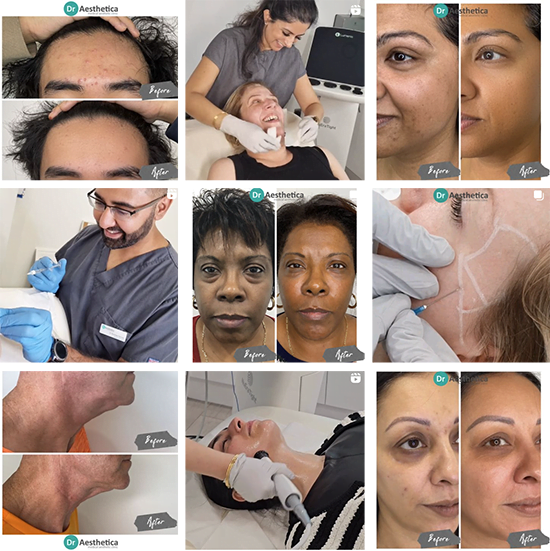There is no denying that in the UK and around the world, the number of women and men undergoing dermal filler treatments is steadily increasing.
Consequently:
- Many more people are now happier with their appearance
- Premature skin ageing can now be better contained
- Fewer people have to turn to invasive surgical cosmetic treatments
Despite these fantastic benefits, like anything in life, there are a few downsides.
One of them, the more people undergo filler treatment, the more likely not everyone will be happy with the results.
And this can happen for a number of reasons, as we will highlight further below.
In today's blog, you will learn more about the different ways filler injectables can turn out poorly, how we diagnose the issue at our clinic, and what methods we have to correct sub-par results for patients who turn to us.
What Causes Disappointing Dermal Filler Results?
First of all, to achieve excellent results with your filler treatment, your injector must:
- Know the anatomy of the face well
- Use the right filler products in the right areas
- Tailor the treatment to your unique facial features
Unfortunately, inexperienced injectors can make certain aesthetic mistakes that can make a filler treatment look "botched", "fake" or produce other unsatisfactory results.
Here are 4 common reasons why this happens.
*Note that an unsatisfactory result is different from an adverse effect of the filler: seek emergency medical attention if you notice an adverse reaction to the filler, such as a change in vision, blue skin discolouration, pallor or severe pain, as these may be signs of a punctured blood vessel.
1. Over-injection directly into the area of concern
Good results require an eye for aesthetics - the ability to examine your facial features and understand how injecting in one area changes the balance in the rest of your face.
This is more complex than treating a single area. When you see an injection specialist about an area that bothers you, he or she should take into account the balance of your facial features and consider all options to achieve your desired look.
For example, if a patient complains of marionette lines (extending from the sides of the mouth to the chin), injecting filler exclusively into these lines will produce an unsatisfactory result. Depending on the patient, the filler can also be injected below the corners of the mouth to subtly lift the expression of the mouth and/or along the jawline to restore lost volume that contributes to a sagging appearance in the lower facial area.
2. Overlooking the overall volume loss
Similar to over-injecting into the affected area, it is important that your injector considers the overall volume loss rather than focusing on specific areas. Since ageing occurs throughout the face, all facial features should be considered in relation to each other in order to achieve a natural look with injectables.
Rather than focusing on each wrinkle and line, fillers are sometimes best used to reverse the ageing process by building volume on a wider area of the face.
3. Attempting to achieve surgical-level results with injectables
Excess sagging skin or certain problems such as jowls and deep marionette lines cannot always be satisfactorily treated with dermal fillers and may require surgical intervention. An experienced filler provider will not offer unsatisfactory treatment to a patient who desires a greater change than can be achieved with injectables. Only the unscrupulous injector overdo a filler treatment to compensate for the inherent limitations of fillers.
4. Using the wrong injectable product
You want your injector to choose the right products for the area they are treating!
There are a variety of filler products for a reason: Each is designed to provide the right amount of flexibility and/or cohesion for specific areas of the face.
Rather than requesting a specific product, focus on your aesthetic goals ("I want to look less tired" or "I want to fill up the deflation on my temples") and follow your injector's advice.
A qualified injector has worked with many products and knows where and how best to use them to achieve the desired results.
If you are not satisfied with the treatment plan you receive, you can always seek a second opinion.
How To Correct a Poor Filler Outcome
Occasionally people are dissatisfied with the results of their dermal fillers.
In other cases, they want to correct aesthetic complications such as asymmetries, lumps and nodules that may form after treatment.
Some very rare but serious complications require immediate action, such as vascular occlusion (when a dermal filler blocks blood flow in your vessels), which can lead to necrosis (tissue death) or, in extremely rare cases, blindness.
At Dr Aesthetica, we have helped many patients correct their dermal filler, especially those in the first two categories. As I have already mentioned that if you suspect a serious complication, you should see your doctor immediately.
However, if you are concerned about a poor aesthetic result, this can be corrected with these two steps:
- Dissolve the filler
Whether you have received too much filler, the filler appears lumpy or your results simply do not look good, we can dissolve the filler. This only works if you have received dermal filler injections with a hyaluronic acid-based product, such as Juvéderm® and Intraline. - Artful reinjection for a better result
Experienced injectors are able to artfully perform reinjections and achieve excellent aesthetic results in many cases. You do not have to give up fillers altogether.
Let me explain this process a little more.
Dissolving Dermal Fillers
First of all, it is important to know that dermal fillers made of hyaluronic acid are much easier to remove than those made of other substances
Removing dermal fillers that are not made of hyaluronic acid dermal fillers will require surgical interventions, while hyaluronic acid dermal fillers can be safely removed with hyaluronidase.
Related: Guide To All Types Of Dermal Fillers
What is Hyaluronidase?
Hyaluronidase is a naturally occurring enzyme in the body that breaks down hyaluronic acid and supports its rapid and constant turnover.
In medicine, hyaluronidase is produced in the laboratory and administered together with other drugs by injection under the skin to treat certain conditions. Using hyaluronidase to break down hyaluronic acid helps to make the fluids and connective tissue thinner so that the medicines can get into the tissue more easily.
In dermal filler reversal treatments, hyaluronidase catalyses the dissolution of the filler and reverses its effect without damaging the skin surface or dermal structure.
After the enzyme is injected into the skin, it takes about 24-48 hours for the filler to dissolve. However, it may take up to a week to see the final result. Also, treatments may need to be repeated several times to completely dissolve the filler.
Hyaluronidase is classified as a drug and therefore requires a prescription. This means that it is only available on prescription from a suitably qualified medical practitioner with a prescribing licence (e.g. a registered doctor, prescribing nurse, dentist or prescribing pharmacist).
At Dr Aesthetica we only recommend you only get hyaluronidase injections from medical professionals who have valid insurance and are registered and regulated by the General Medical Council or other recognised medical bodies.
What Are the Risks of Hyaluronidase Injections?
No medical aesthetic treatment is without risk, however small, and hyaluronidase is no different.
Common reactions that may occur include redness, swelling, pain, itching, bruising and tenderness at the injection site.
As hyaluronidase is an enzyme that breaks down hyaluronic acid, there is a risk that it may also break down the hyaluronic acid that occurs naturally in your body.
This can affect the quality of the skin in the area.
Administration of hyaluronidase can also cause anaphylaxis (severe allergic reaction). A medical practitioner should carry out a thorough consultation to ensure that you are suitable for the treatment.
It should also be noted that hyaluronidase is not a 'miracle cure". Just because you have this reversal does not mean you will be completely satisfied with your outcome.
What If Hyaluronidase Is Not An Option?
There are cases where the patient might be sensitive or allergic to hyaluronidase. In such cases the options are limited. That said, there are still a few things we can try.
- We can try massaging the area and manipulate the filler into a better position. This will only work if the filler is still mobile (preferably if the patient comes in within the first few days of the treatment.)
- We can also use radio frequency skin tightening machine to soften the tissue.
- At times it is possible to use dermal filler around the complication to blend, this often does not work well and tends to lead to more problems down the line.
Reinjection: Getting New Fillers After Reversal Treatment?
Can you get dermal fillers injected again after you have removed them with hyaluronidase? Yes, you definitely can!
In many cases, hyaluronic acid injections usually leave patients with a relative volume deficit in the injection area. Therefore, many patients choose to have dermal fillers re-injected.
Of course, it is best if you do not go back to the same injector who caused the problem in the first place!
Also, you cannot get new fillers straight away. It is important to wait until the swelling has completely gone down before re-injecting the filler
To allow your skin to settle down after the hyaluronidase injections, it's advisable to wait several weeks. The exact time will vary from person to person and your injector will know the best treatment plan for you.
In cases where hyaluronic acid fillers have been injected poorly, this allows us a clean slate to re-evaluate your anatomy to find a treatment plan that achieves the desired results.
Hyaluronidase and Filler Reinjection with Dr Aesthetica
If you are dissatisfied with your dermal filler results from another provider, we are here to help. We have helped many other patients like you reverse poor filler results with hyaluronidase. You don't have to wait months on end hoping the filler dissolves naturally.
In case you want to resume your filler treatment, we got you covered.
There are many time-tested and proven techniques that our injectors use to enhance your facial features, restore volume and ultimately help you look your best. Get in touch with us today!


